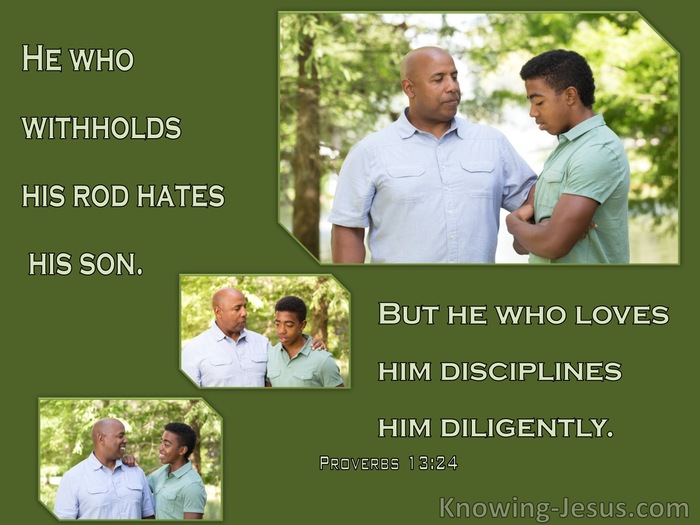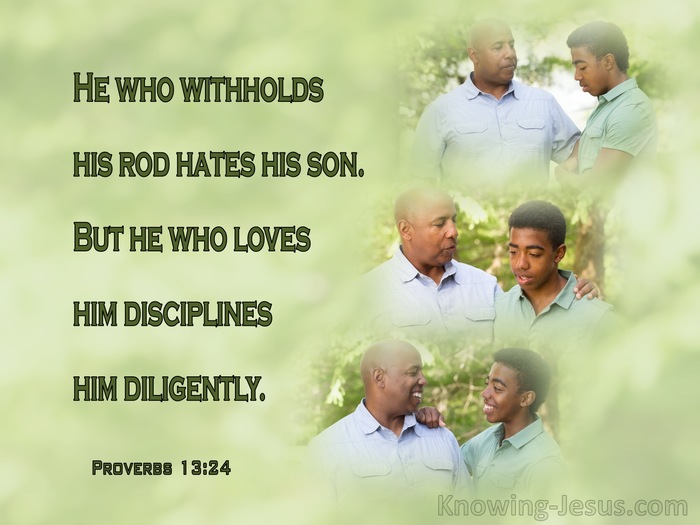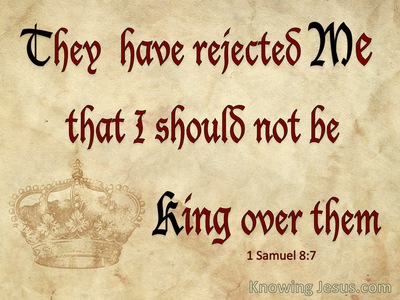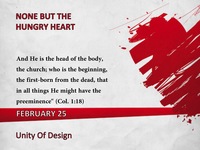◄ What Does Proverbs 13:24 Mean? ►
He who withholds his rod hates his son, But he who loves him disciplines him diligently.
Proverbs 13:24(NASB)
Verse of the Day
Solomon is credited with the learned sayings in the book of Proverbs. As a young man, he acted on the wise counsel of his own father king David, and as an older man, he wanted to pass on judicious advice to his own sons. There are many sayings in this book that are familiar to most Christians like: "The fear of the Lord, is the beginning of wisdom;" "Knowledge of the Holy One is understanding;" "Pride goes before destruction, and a haughty spirit before a fall."
One verse we all seek to apply in our own Christian life is: "Trust in the LORD with all your heart and lean not on your own understanding." Similarly, many parents are aware of the promise: "Train up a child in the way he should go, and when he is old he will not depart from it." One equally, well-loved verse, at the end of the book is: "Who can find a virtuous woman? for her price is far above rubies", and another favourite verse is: "A cheerful heart is good medicine, but a crushed spirit dries up the bones."
In Proverbs 13:24 we read: "He who withholds his rod hates his son, but he who loves him disciplines him diligently." As with all Biblical principles, this is a wise saying, but this excellent advice is often misquoted as "Spare the rod and spoil the child." This popular saying is not from Scripture. It is part of a poem, which was written in 1664 by a man called Samuel Butler. This quote has been used by those that are over-zealous disciplinarians or deliberately misapplied by abusive legalists who are nothing more than cruel, cowardly bullies who delight in hurting children.
It has also been used by militant, religious pacifists, and aggressive non-believers who resist God's Word and quote the Bible incorrectly, and is often taken out of context in order to discredit the Scriptures and denigrate the holy character of God. However, when this verse is considered in its correct, biblical context, it is understood as an important strategy in equipping parents in the teaching, training, and disciplining of children within their family.
In today's economy, the word 'rod' is often regarded as an implement used in connection with corporal punishment. A rod is often interpreted to mean a teacher's cane, a belt, or a birch that was used to punish naughty children or prisoners. A rod often brings with it the idea of beating or flogging those that are vulnerable or insubordinate with a wooden cane or stick. But this is not the biblical meaning of 'rod'
A 'rod' or a 'staff' in the Bible was often the limb of a tree or a stout stick that a herdsman would take and whittle into a shepherd's crook. While the shepherd would use his rod to ward off wild animals, or thieves, who came to break in and steal the sheep, his rod was never used to harm the sheep. It was more often an instrument for guidance or comfort. Believers are often referred to as sheep and lambs, while Jesus is seen as the Good Shepherd of the sheep. In Psalm 23, David wrote the well-loved words: "Thy rod and thy staff, they comfort me." Interpreting Scripture should always be carried out grammatically and in a correct, historical context.
A shepherd's rod was also used to count the sheep that belonged to the herdsman. For instance, in Ezekiel 20 we read: "I will take note of you as you pass under my rod." Similarly, a rod was a tool a shepherd would use to rescue a sheep in difficulties. It could also be used as a chastening rod to discipline those that wandered off into foolhardy ways, or to pilot a wayward animal along the best path, which we see in the context of children in Proverbs 22: "For foolishness is bound in the heart of a child; but the rod of correction shall drive folly far away."
When Proverbs 13:24 is seen in its correct, biblical context, it is evident that the rod in this passage, refers to a parent's use of wise discipline to teach their child important lessons in life. When he wrote: "He who withholds his rod hates his son, but he who loves him disciplines him diligently," Solomon's use of the word 'rod' was connected with the wise discipline of a loving parent towards a beloved child. A very different concept from the secular view of "Spare the rod and spoil the child."
But some wonder why Solomon would say that a father "HATES" his child if he withholds discipline, while others, erroneously correlate discipline with being mean and unloving. But this demonstrates that those with this viewpoint, do not understand godly LOVE. They do not understand that disciplining a child diligently is a demonstration of a parent's love for his offspring, just as God's chastening of His children is a demonstration of God's LOVE towards us: "For the Lord disciplines those He loves, just as a father disciplines the son in whom he delights." Proverbs 3:12 "For the Lord disciplines those He loves and punishes every child He accepts." Hebrews 12:6
It is not out of hatred that a child is disciplined, but out of love for that child. It is not out of hatred that the Lord chastens His children but a demonstration of His deep love towards us, for discipline brings growth and builds a Christlike character.
Today, truth is twisted, the Bible is interpreted incorrectly, Scriptures are discredited, and the holy character of God is denigrated. Today, believers are having to endure much suffering at the hands of the ungodly, but when we can recognise that God takes the trials of the enemy and uses them as tests of our faith, we can identify the sufferings we undergo as godly discipline which the Lord is using in our lives for our eternal benefit.
When we can recognise that just as a father who withholds his rod hates his son, while the one who loves his child disciplines him diligently, we will be able to see that the trials we are facing today show that God is dealing with us as sons. For what son is there that a father does not discipline?
May we never forget that the sufferings of this present time and the chastening we inevitably face, are not worthy to be compared with the glory which shall be revealed to us.
My Prayer
Heavenly Father, thank You for the book of Proverbs and the many lessons that I have been able to learn and understand. Thank You, that You are a God Who cares deeply for each of Your children and that You use the choices we make, both good and bad, to discipline us, develop our faith in You and increase our patient endurance. Thank You, that godly discipline in the lives of Your children, is a tool you are using for Your greater glory and our eternal benefit. Help me to embrace the chastening rod of Your Spirit in my life, so that I learn the lessons You want to teach me. This I ask in Jesus' name, AMEN.
Choose a Verse from Proverbs 13
Proverbs 13:24 Further Study
- Proverbs 13:24 in the Parallel Bible
- Proverbs 13:24 in the Thematic Bible
- Proverbs 13:24 Cross References
- Proverbs 13:24 Treasury of Scripture Knowing
- Proverbs 13:24 Sermons
- Proverbs 13:24 Prayers
- Proverbs 13:24 Images
- Proverbs 13:24 Devotionals
- Choose Chapter
Never miss a post















